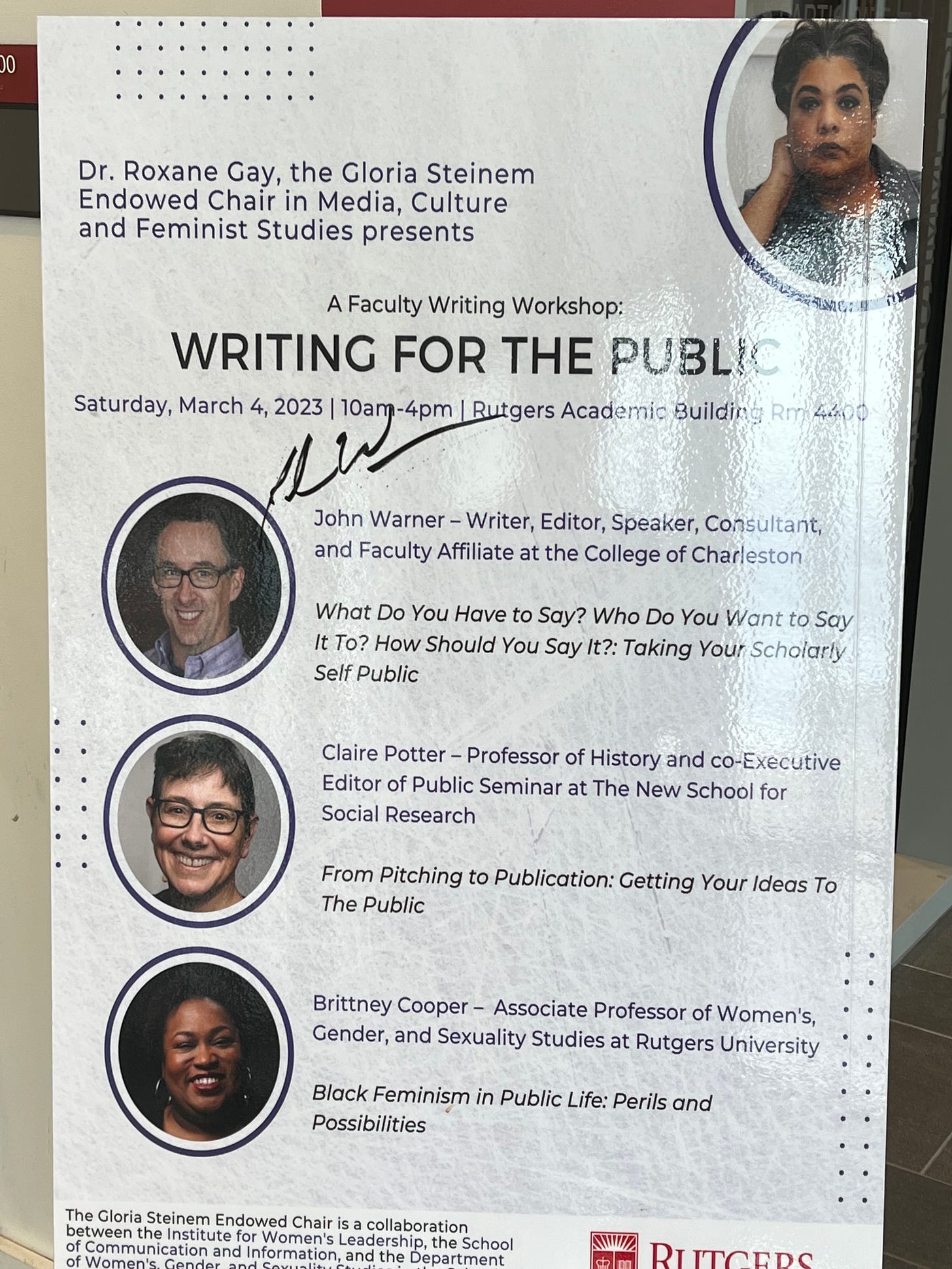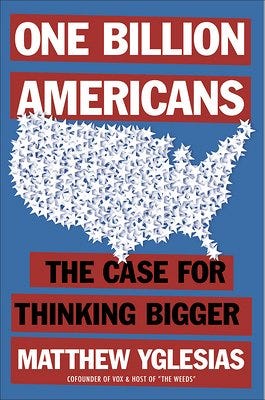This weekend I had the pleasure of speaking at a conference at Rutgers University organized by Roxane Gay for folks in academia who are interested in writing for the public.
As part of my talk, I shared a taxonomy of “public writers,” the different categories of people who make up the larger firmament of what we as readers consume. The intention in the talk was to help the attendees find their place as public writers, but as I was speaking, I realized that the categories may also be helpful to readers, because I think they may help reveal a little bit what’s working underneath the different ways writers engage with their audiences.
The Popularizer takes some novel idea or object of fascination in academic studies and turns it into an interesting and readable narrative. The goal of the popularizer is to tell the audience how the world works in a way that is simultaneously counterintuitive (the fascinating part) and also completely believable (the part that prevents people from thinking you’re full of horse hooey).
This is as hard as it sounds. To write about something in a way that is simultaneously surprising and that can also quickly settle into conventional wisdom is very difficult and I almost do not understand how the popularizers do it.
The preeminent example of a popularizer working today is Malcolm Gladwell.
In a previous newsletter I explored the question: “Is Malcolm Gladwell full of crap or what?” And my answer was, “sort of, pretty much, yes.”
But, for his readers it doesn’t matter. It doesn’t matter to Gladwell either, who says this about his method.
I am a story-teller, and I look to academic research … for ways of augmenting story-telling. The reason I don’t do things their way is because their way has a cost: it makes their writing inaccessible. If you are someone who has as their goal … to reach a lay audience … you can’t do it their way.”
I don’t have any specific beef with Gladwell, and have enjoyed reading his books, but I have to keep in mind that I may not be getting the gospel truths.
It’s a good story, the same way it’s fun to think about our days and nights Helios in his chariot pulling the sun across the sky, but that doesn’t make it the truth.
The Decider is here to tell you how the world works by marshaling data and evidence about a particular topic on which they’re presenting themselves as experts. The goal of The Decider is to absolve the audience of having to use their own judgment to figure out what to do.
Audiences love this. The world is a complex and contradictory place and we often feel pressure to “do the right thing,” but we have neither the time nor the expertise to figure these things out for ourselves.
For example, Mrs. Biblioracle and I recently decided we wanted an air fryer oven and I looked at the New York Times Wirecutter product testing section recommendation and ran with it.
When the question gets more complicated than a counter appliance, depending on the subject and your underlying values, the decider can either be a real balm to your spirit, or the opposite, sandpaper against your skin.
The Decider always presents as an expert. Sometimes that expertise is rooted in credentials, sometimes it’s simply because they’re recognizable and famous, but to be a Decider, you can’t just be a random person because random people aren’t necessarily worth listening to. The Decider is related to self-help in that they, The Decider, are going to tell you what to believe, and having told you what to believe, you will in turn do what they recommend.
Marie Kondo (The Life-Changing Magic of Tiding Up: The Japanese Art of Decluttering) is a kind of soft sell Decider, in this case trading on stereotyped notions of her culture as her authority.
In the academic world, Brown economist Emily Oster is a great example of a Decider. Her books, such as the most recent, The Family Firm: A Data-Driven Guide to Better Decision Making in the Early School Years, promise to give parents a definitive guide to making sure they put their children on a trajectory towards success.
The key part here is the use of “data-driven” in the title, suggesting that if the data says it’s true, it must be the right thing. The wrinkle when it comes to listening to Deciders is that sometimes the underlying values which determine what data is important may be at odds with the values of the reader.
Kondo, for example, drove many readers who were busy juggling work, kids, and family batty, creating far more stress than joy as they tried to follow her precepts.
Interestingly, once Kondo had her third kid, she seemed to do a little rethinking about the necessity of all that tidying up, releasing Marie Kondo's Kurashi at Home: How to Organize Your Space and Achieve Your Ideal Life, which seems to have a more relaxed attitude towards clutter.
Oster’s books are geared toward upper-middle class college educated folks who would like to insure their children capitalize on their advantages of birth and want to be reassured that they’re doing the right thing in that pursuit. While Oster’s earlier books on pregnancy and the early years were designed to ratchet down some of the worry around issues like drinking alcohol or eating sushi, The Family Firm outlines a method for managing your family as though you’re a McKinsey consultant. This sounds like an absolute misery to me, but I don’t have kids, so what do I know?
What I do know is that these books are very popular and I’m certain Oster is busy working on her book about negotiating “tween” life, and then teens after that. Similar to Kondo, though, if the reader’s values do not sync with the author’s you will find yourself somewhere between alienated and actively angry about what you are reading, but you may also feel uncertain in the face of the blizzard of “data” Oster rains down on you.
“The data doesn’t lie” has become a cliche, but it’s not actually true. Data lies all the time when we are relying on data that’s not rooted in what we believe to be most important. As I wrote in a previous installment on “the problem of outrage” During the pandemic, Oster became a highly polarizing figure for her “data-driven” advocacy for opening schools to in-person instruction prior to widely available vaccines, by emphasizing the relatively low risk of severe Covid outcomes, in aggregate, for young children, while championing the benefits of socialization in school.
The rub is that parents tend not to think about children in aggregate; they worry about their own kids. Oster’s analysis also tended to sidestep the risk of the adults in the school buildings.
Another wrinkle is that, according to a recently released comprehensive analysis, teen suicides fell during the lockdown phase of the pandemic, and increased when schools returned to in-person sessions. The researchers looked at the data down to the county level and found a strong correlation between school being in session and increased numbers of suicides, even showing that the rate dropped in the summer months when school was not in session.
Part of what the Decider decides is what data is worth paying attention to. Oster’s data-driven case rests on an assumption that school=good for students, but this is not necessarily true, certainly not for all students.
The irony of the whole thing is that we reach for the work of the Decider to help navigate a complex and contradictory world, but there’s times where failing to recognize those complexities could lead to bad decisions at the individual level.
The online warrior is motivated by someone being wrong on the Internet.
Someone else, that is, because to be an online warrior requires never admitting to being mistaken. Essentially, the M.O. of the online warrior is to conduct a series of feuds, ostensibly about issues, but which are mostly a proxy battle for whose world view is the most correct.
One way of thinking about the Online Warrior is that they would like to be Deciders, but because the bulk of their work is done on the Internet, all of those people who don’t like what they have to say come with their slings and arrows to knock them over, which necessitates a constant battle for supremacy.
The online warrior mentality is best illustrated by the writer I consider the happiest warrior of them all, Matthew Yglesias, who described his method by saying: “I put things out. People yell at me. I write again the next day.”
One reason Yglesias may be happy is his seven-figure income from his Substack newsletter.
Online Warriors like Yglesias and New York magazine’s Jonathan Chait spend a lot of time writing about how other people they’re feuding with online are wrong and the whole thing becomes a kind of meta-debate about who is or isn’t trustworthy, rather than an actual discussion of the issues at hand.
Each side has supporters who chime in and battle it out on their champion’s behalf.
I’m actually a little ashamed about how much I know about who these guys feud with online and what they feud about, because while the stakes of the issues themselves are important, the drama that surrounds the debates is far more of a draw.
I’ll never again give Mrs. Biblioracle side-eye about watching the Real Housewives franchise because honestly, this is just my version of that.
Online Warriors do occasionally write books, but interestingly, despite Yglesias and Chait having massive social media followings, their books sell at John Warner-like levels, rather than becoming breakout hits.
Chait’s most recent book, Audacity: How Barack Obama Defied His Critics and Created a Legacy that Will Prevail was pretty much obviated at the moment of its release on the eve of the inauguration of President Donald Trump. The book is a form of wish casting by the center-left Chait for people to continue to believe that an Obama-esque approach is the proper path for the Democratic Party.
Yglesias’ book, One Billion Americans: The Case for Thinking Bigger, is actually a sort of interesting hodgepodge of policy analysis that essentially argues for massively increasing immigration in order to keep our public services funded though increased individual productivity.
The title is true Online Warrior troll bait meant to infuriate American nativists and drive the outrage that draws attention. I wonder if the goal was to get Tucker Carlson to froth over the book. While I found the book sort of interesting, it is almost unfathomably dry even as it tries to be provocative. Yglesias is just a fundamentally uninteresting writer in terms of how the words accrue on the page. There is no energy or life-force to his prose, something that works okay at newsletter length, but which quickly bogs down at book length.
A book-length work from Matthew Yglesias without the Greek chorus of his haters saying what an a-hole he is, while his fans assure us he’s a genius just doesn’t have the same juice.
This portion of my talk was based in a newsletter from last month on “Engagement, Attention, and Shining a Light” in which I make my case for valuing writers that embrace complexity of thought and human connection with the reader.
I won’t repeat myself here, but in preparation for my talk, having reflected further about what divides an Illuminator from a Decider from an Online Warrior from a Popularizer, I’m even more appreciative of what those writers do for us as readers.
Before I move on to links and recommendations, I’d be remiss if I didn’t point folks towards the work of my fellow presenters and host, including newsletters of Claire Potter
and as great examples of public work that seeks illumination.As an erstwhile Chicagoan, found Potter’s breakdown of the collapse of Chicago mayor Lori Lightfoot’s political support particularly interesting.
And Professor Brittney Cooper’s Eloquent Rage: A Black Feminist Discovers Her Superpower is part memoir, part manifesto on the justified, necessary anger of Black women in America.
At the Chicago Tribune this week I lament the abject silliness of people who overwhelmed the submissions inboxes of a handful of publications with ChatGPT-generated work. My online course in Teaching Writing in the Age of Artificial Intelligence recently passed the 100th participant mark. Exciting!
The New York Times has “14 New Books for March,” including two on my radar, The New Earth by Jess Row and Lone Women by Victor Lavalle.
Chris Pine, movie star, was apparently an English major and has interesting taste in books.
We recently observed the 50th anniversary of Thomas Pynchon’s Gravity’s Rainbow.
Pen America recently announced the winners of their annual awards. Percival Everett took home the biggest prize, the $75,000 Jean Stein Book Award for his novel, Dr. No.
All links to books from this site go to Bookshop.org, and affiliate income will be donated to Open Books of Chicago, and another book or reading-related charity to be named later. (Make a recommendation in the comments!)
1. The Island of Sea Women by Lisa See
2. Transcendent Kingdom by Yaa Gyasi
3. The School for Good Mothers by Jessamine Chan
4. Where the Children Take Us by Zain E. Asher
5. Thirty Talks Weird Love by Alessandra Narváez Varela.
Karla M. - El Paso, TX
Luis Alberto Urrea has a new novel coming out later this spring, which makes this a good time to catch up with his previous book, The House of Broken Angels.
Share The Biblioracle Recommends
I’m hitting the road again next week. If you’re proximate to the University of Alabama you can come see me give a public talk on the pedagogical implications of ChatGPT.
Have a good week, one and all.
John
The Biblioracle
from Hacker News https://ift.tt/wvUtMiK



No comments:
Post a Comment
Note: Only a member of this blog may post a comment.